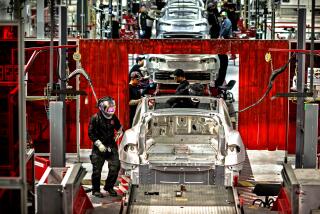FedEx chief sees economic lift by fall
One day after FedEx Corp. announced it would trim 900 jobs from its hardest hit shipping arm, Chief Executive Fred W. Smith said Tuesday that he expected the U.S. economy to improve by late summer or early fall.
The 900 workers amount to less than 3% of the roughly 35,000 employees of FedEx Freight, one of the Memphis, Tenn., package delivery company’s major segments dealing with automotive, industrial and home construction materials.
The job cuts come at a time when rival DHL Express has all but abandoned the U.S. market and the U.S. Postal Service is pushing to return to a five-day delivery week. As an industry that transports pretty much everything, the delivery business is considered an economic bellwether.
“We have tried to do all that we can to avoid layoffs, but the industrial segment has been a tough market. It is ground zero of the U.S. economy,” said Smith, noting that the company first reduced employee salaries -- including his, by 20% -- and also is taking a one-year hiatus from contributing to the company’s 401(k) plan. FedEx has more than 290,000 employees worldwide.
Smith, in Los Angeles to visit company operations and to address community leaders at a Town Hall Los Angeles meeting Tuesday, said about 90 to 100 California workers would be laid off. Company executives said some would find work elsewhere in the company while others might be brought back as the economy regains steam. Smith expects that rebound to begin late in the year because companies will be forced to replenish badly depleted inventories.
Smith’s experience in talking with customers and his company’s struggle to make a profit after last summer’s record-high fuel prices and deteriorating economic conditions have left him with strong opinions about what would help turn things around.
Efforts to buttress the economy have focused too much on shoring up the financial sector when it would make far better sense to devote more to the nation’s manufacturers, Smith said, adding that Southern California remains the biggest U.S. manufacturing center. The economy would be better served, he said, by giving incentives to boost capital investment spending by businesses.
“The only way you make a blue-collar worker better off is to invest in infrastructure and training,” Smith said. The U.S. government should allow businesses to deduct capital expenditures immediately, rather than slowly over time, to reduce the risk of spending during uncertain times, he said.
Smith also criticized the nation’s dependence on foreign oil, calling last summer’s run-up of crude oil prices to above $147 a barrel as the event that finally drove some companies out of business and some consumers over a financial cliff.
“It was the match that set off the financial crash,” Smith said, adding that the U.S. needs to turn to electric hybrid vehicles for “short-haul transportation of 40 to 50 miles.”
In its fiscal second-quarter earnings, announced in December, FedEx sales were up slightly, to $9.54 billion from $9.45 billion a year earlier. Profit increased to $493 million from $479 million.
FedEx shares fell $3.63 to $52.03.
--
More to Read
Inside the business of entertainment
The Wide Shot brings you news, analysis and insights on everything from streaming wars to production — and what it all means for the future.
You may occasionally receive promotional content from the Los Angeles Times.











